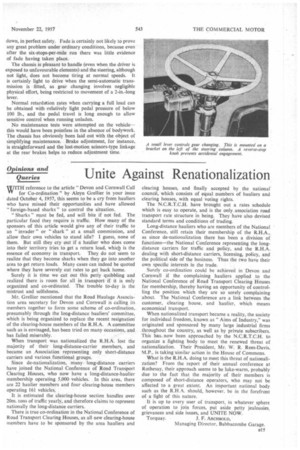Opinions and Queries
Page 49

If you've noticed an error in this article please click here to report it so we can fix it.
Unite Against Renationalization
WITH reference to the article "Devon and Cornwall Call for Co-ordination" by Aleyn Grellier in your issue dated October 4, 1957, this seems to be a cry from hauliers who have missed their opportunities and have allowed "foreign-based sharks" to control the situation.
" Sharks " must be fed, and will bite if not fed. The particular food they require is traffic. How many of the sponsors of this article would give any of their traffic to an " invader " or " shark " at a small commission, and allow their own vehicles to stand idle? I guess, none of them. But still they cry out if a haulier who does come into their territory tries to get a return load, which is the essence of economy in transport. They do not seem to realize that they become sharks when they go into another area to get return loads. Many cases can indeed be quoted where they have severely cut rates to get back home.
Surely it is time we cut out this petty quibbling and realized there is room for all in transport if it is only organized and co-ordinated. The trouble to-day is the mistrust and selfishness.
Mr. Grellier mentioned that the Road Haulage Association area secretary for Devon and Cornwall is calling its members together to form some scheme of co-ordination, presumably through the long-distance hauliers' committee, which is being organized to replace the recent resignation of the clearing-house members of the R.H.A. A committee such as is envisaged, has been tried on many occasions, and has failed miserably.
When transport was nationalized the R.H.A. lost the majority of their long-distance-carrier members, and became an Association representing only short-distance carriers and various functional groups.
Since de-nationalization, many long-distance carriers have joined the National Conference of Road Transport Clearing Houses, who now have a long-distance-haulier membership operating 5,000 vehicles. In this area, there are 22 haulier members and four clearing-house members operating 161 vehicles.
It is estimated the clearing-house section handles over 20m. tons of traffic yearly, and therefore claims to represent nationally the long-distance carriers.
There is true co-ordination in the National Conference of Road Transport Clearing Houses, as all new clearing-house members have to be sponsored by the area hauliers and clearing houses, and finally accepted by the national' council, which consists of equal numbers of hauliers and clearing houses, with equal voting rights.
The N.C.R.T.C.H. have brought out a rates schedule which is easy to operate, and is the only association road transport rate structure in being. They have also devised standard terms and conditions of trading.
Long-distance hauliers who are members of the National Conference, still retain their membership of the R.H.A., as since de-nationalization there has been a division of functions—the National Conference representing the longdistance carriers for traffic and policy, and the R.H.A. dealing with short-distance carriers, licensing, policy, and the political side of the business. Thus the two have their own specific interests in the trade.
Surely co-ordination could be achieved in Devon and Cornwall if the complaining hauliers applied to the National Conference of Road Transport Clearing Houses for membership, thereby having an opportunity of controlling the position which they are so sorely complaining about. The National Conference are a link between the customer, clearing house, and haulier, which means economical transport.
When nationalized transport became a reality, the society for individual freedom, known as "Aims of Industry," was originated and sponsored by many large industrial firms throughout the country, as well as by private subscribers. This has. now been approached by the N.C.R.T.C.H. to organize a fighting body to meet the renewed threat of nationalization. Their President, Mr. NV. R. Rees-Davis. M.P., is taking 'similar action in the House of Commons.
What is the R.H.A. doing to meet this threat of nationalization? From the report of their annual conference at Rothesay, their approach seems to be luke-warm, probably due to the fact that the majority of their members is composed of short-distance operators, who may not be affected to a great extent. An important national body such as the R.H.A. should, however, be in the forefront of a fight of this nature.
It is up to every user of transport, in whatever sphere of operation to join forces, put aside petty jealousies, grievances and side issues, and UNITE NOW.
Torquay. J. F. ARCHBOLD,
Managing Director, Babbacombe Garage.




























































































